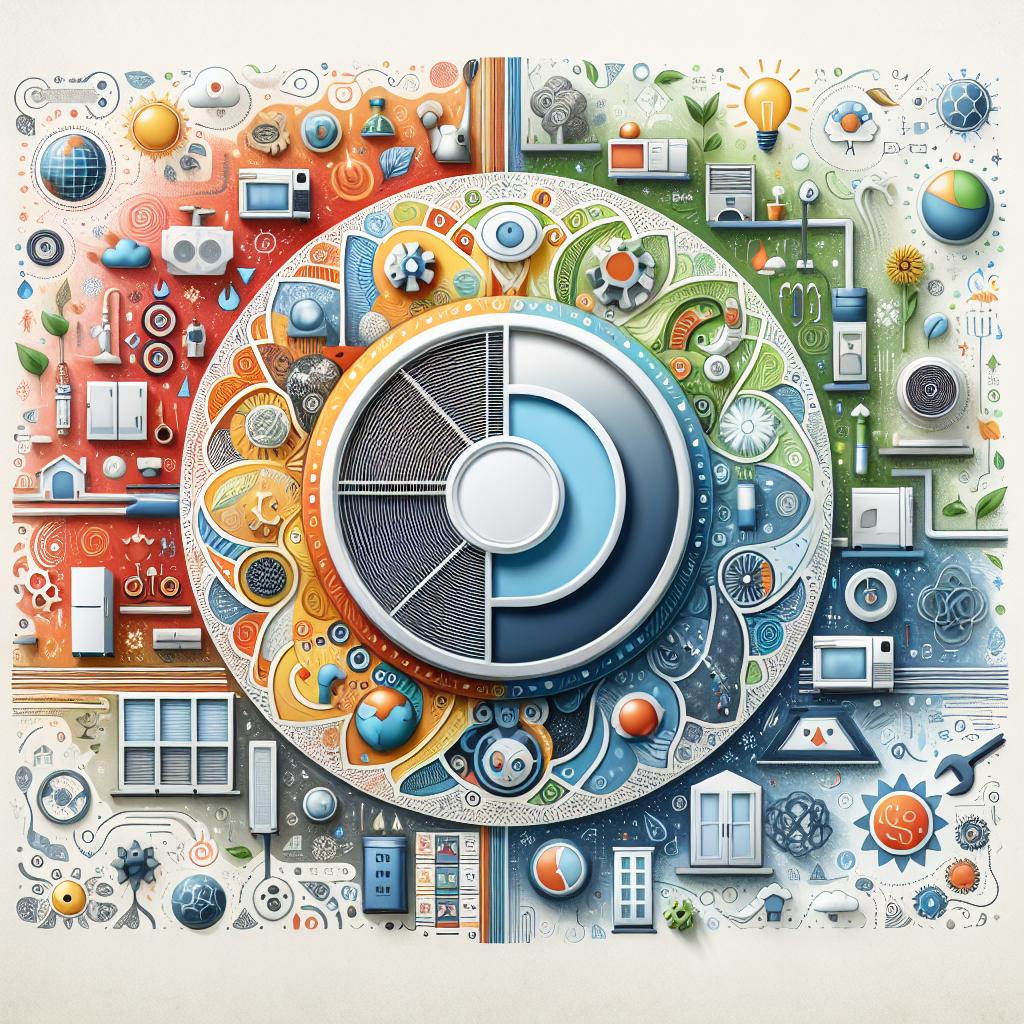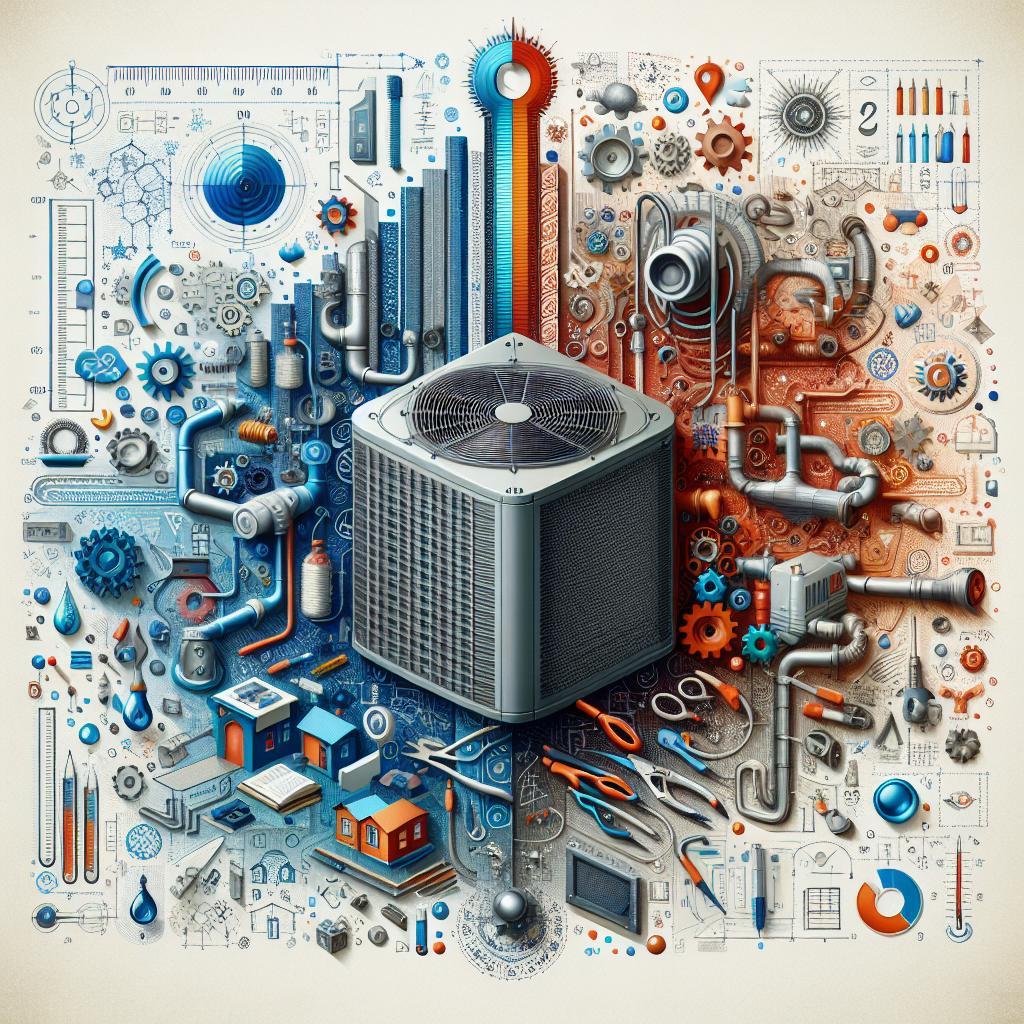In the realm of modern comfort, HVAC (Heating, Ventilation, and Air Conditioning) technicians play an unsung yet vital role. As the invisible hands behind the scenes, these professionals ensure that the air we breathe is not only conditioned to our liking but also regulated for safety and efficiency. But what exactly does a day in the life of an HVAC technician look like? From diagnosing complex systems to installing cutting-edge technology, the HVAC job encompasses a diverse range of skills and responsibilities that are essential to both residential and commercial settings. In this article, we will unravel the intricacies of HVAC careers, exploring the duties, challenges, and rewards that come with this dynamic field. Whether you’re considering a career in HVAC or simply curious about the work involved, join us as we delve into the world of temperature control and air quality management.
Understanding the Essential Role of HVAC Professionals
HVAC professionals play a crucial role in maintaining the comfort and safety of residential and commercial spaces. Their expertise encompasses a variety of systems and technologies, which include but are not limited to:
- Heating Systems: Installation and maintenance of furnaces and heat pumps.
- Ventilation: Ensuring proper air flow and air quality.
- Air Conditioning: Installation, repair, and servicing of AC units.
- Refrigeration: Troubleshooting and repairing cooling systems.
Beyond technical skills, HVAC professionals must possess strong problem-solving abilities and customer service skills. They are often called upon to diagnose complex issues in systems that can affect energy efficiency and overall performance. Their work not only supports comfort but also contributes to environmental sustainability through optimal energy use. The following table highlights the key responsibilities and skills required:
| Responsibilities | Essential Skills |
|---|---|
| System Installation | Technical Knowledge |
| Regular Maintenance | Attention to Detail |
| Troubleshooting Issues | Problem-Solving |
| Customer Interaction | Communication |

Key Skills and Qualifications for a Successful HVAC Career
To excel in the HVAC field, individuals must possess a blend of technical knowledge and practical skills. Proficiency in the fundamentals of heating, ventilation, and air conditioning systems is crucial. A solid grasp of electrical components, refrigeration methods, and thermodynamics enables HVAC professionals to diagnose issues efficiently and execute repairs effectively. Additionally, understanding building codes and safety regulations is essential to ensure that installations comply with industry standards.
Beyond technical capabilities, soft skills also play a vital role in an HVAC career. Effective communication fosters better interactions with clients and colleagues, making it easier to assess needs and deliver solutions. Furthermore, problem-solving skills are necessary for troubleshooting unexpected issues that may arise during installations or maintenance. Here are some key qualifications that enhance an HVAC technician’s profile:
- Technical Certification: Completion of a recognized trade school program.
- Licensing: Relevant state or local licenses, depending on jurisdiction.
- Experience: Hands-on training through apprenticeships or prior work experience.
- Customer Service Abilities: Capability to engage effectively with clients and address their concerns.
- Physical Stamina: Ability to lift heavy equipment and work in various conditions.

Navigating the HVAC Job Market: Opportunities and Trends
The HVAC job market is currently experiencing significant shifts, driven by technological advancements, increased energy efficiency demands, and the growing emphasis on environmental sustainability. As more businesses and homeowners prioritize environmentally friendly solutions, the demand for skilled HVAC technicians is on the rise. Employers are now seeking professionals who not only possess traditional HVAC skills but also have expertise in systems that integrate renewable energy sources, such as solar panels and geothermal heating. This evolution creates a multitude of career opportunities for individuals entering the field or looking to expand their skill sets.
Key trends shaping the HVAC workforce include the increasing role of automation and smart technologies in heating and cooling systems. Prospective job seekers should familiarize themselves with smart HVAC solutions, as these are becoming industry standards. Additionally, as the industry grapples with a shortage of skilled labor due to baby boomers retiring, there is an urgent need for fresh talent to fill roles ranging from installation and maintenance to sales and engineering. The following table highlights current opportunities in the HVAC sector:
| Job Role | Skills Required | Growth Outlook |
|---|---|---|
| Service Technician | Repair, Troubleshooting, Customer Service | High |
| Installation Specialist | Hands-On Skills, Blueprint Reading | Steady |
| Sales Engineer | Technical Knowledge, Sales Skills | Growing |
| Energy Auditor | Analytical Skills, Knowledge of Energy Codes | High |

Best Practices for Advancing Your HVAC Career Path
Advancing your career in the HVAC industry requires both skill enhancement and strategic networking. Consider pursuing certifications that can set you apart from your peers. Here are some additional actions to elevate your professional game:
- Continuing Education: Engage in workshops and online courses.
- Networking Opportunities: Attend industry conferences and local seminars.
- Mentorship: Seek guidance from experienced professionals.
- Hands-On Experience: Volunteer for challenging projects to broaden your expertise.
Developing a personal brand is equally important in the HVAC field. Make sure to showcase your skills and experiences through various platforms such as LinkedIn or industry-specific forums. Here’s how to build your personal brand effectively:
- Online Presence: Create a professional website or portfolio that highlights your work.
- Social Media Engagement: Share insights and articles related to HVAC.
- Professional Associations: Join organizations like ASHRAE or ACCA for resources and networking.
Q&A
What is an HVAC Job? A Q&A Exploration
Q1: What does HVAC stand for?
A1: HVAC stands for Heating, Ventilation, and Air Conditioning. It’s the intricate system that keeps our indoor environments comfortable, ensuring we’re cozy in winter and cool in summer.
Q2: What exactly does an HVAC technician do?
A2: An HVAC technician is much like a medical doctor for your home or office climate. They install, maintain, and repair systems that regulate temperature and air quality. Whether it’s troubleshooting a malfunctioning furnace or installing a new air conditioning unit, these professionals are essential to our comfort.
Q3: What skills are necessary for a successful HVAC job?
A3: It’s more than just fixing things. A successful HVAC technician needs a blend of technical skills, including a strong understanding of electrical systems, plumbing, and refrigeration. Problem-solving abilities, attention to detail, and strong communication skills also come into play, allowing them to effectively serve clients and explain complex issues in simple terms.
Q4: What kind of education or training is required for an HVAC job?
A4: While some positions may require only a high school diploma, many employers prefer candidates with post-secondary training from vocational schools or community colleges. Completing an HVAC certification program—typically lasting 6 months to 2 years—can provide a foundational understanding of the trade. Apprenticeships are also common, offering hands-on mentorship alongside classroom instruction.
Q5: Are there different specialties within HVAC jobs?
A5: Absolutely! HVAC professionals can specialize in various areas such as residential or commercial systems, refrigeration, and even energy management systems. Some techs focus on installation while others may specialize in maintenance or repair, catering to specific needs and environments.
Q6: What is the work environment like for HVAC technicians?
A6: HVAC technicians work in varied settings, from residential homes to large commercial buildings. The job can require climbing ladders, working in tight spaces, or handling heavy equipment. Technicians often travel between job sites, ensuring no two days are ever quite the same.
Q7: What are the job prospects like in the HVAC field?
A7: The job outlook for HVAC technicians is robust. As technology advances and the demand for energy-efficient systems grows, there’s an increasing need for skilled professionals. According to the U.S. Bureau of Labor Statistics, employment in the HVAC field is projected to grow faster than the average for other occupations.
Q8: What are some challenges HVAC technicians face?
A8: Challenges can range from dealing with emergency repairs at inconvenient hours to navigating difficult weather conditions. Technicians must also stay updated with constantly evolving technology and regulations. It’s a job that requires continuous learning and adaptability.
Q9: What personal qualities are beneficial for someone in an HVAC job?
A9: Successful HVAC technicians often exhibit qualities such as patience, persistence, and a strong work ethic. A friendly demeanor also helps, as technicians frequently interact with clients who may be stressed about their heating or cooling issues. Empathy and good listening skills enhance customer service experiences.
Q10: Is an HVAC career a good choice for someone looking for job stability?
A10: Indeed! HVAC careers are not only stable but also offer opportunities for advancement. As you gain experience and specialize, there are avenues for higher positions, such as service manager or even starting your own HVAC business. With a consistent need for skilled technicians, it’s a viable and rewarding career choice.
This Q&A should provide a well-rounded understanding of what an HVAC job entails, all while maintaining a neutral and informative tone. Whether contemplating a career in HVAC or simply curious about the field, this guide sheds light on the vital role these professionals play in our everyday comfort.
In Retrospect
a career in HVAC offers a unique blend of technical skill, problem-solving, and the satisfaction of keeping our environments comfortable. Whether you’re diagnosing a malfunctioning air conditioning unit or designing an energy-efficient heating system, HVAC professionals play a vital role in both residential and commercial spaces. As technology continues to evolve, so too does the demand for skilled workers in this field, making it a promising path for those interested in hands-on work with tangible results. So, if you’re considering a journey into the world of HVAC, know that you’re stepping into a profession that not only supports the comfort of others but also contributes to the future of sustainable living. Your role could be the key to ensuring that families and businesses thrive in a climate-adjusted world.

